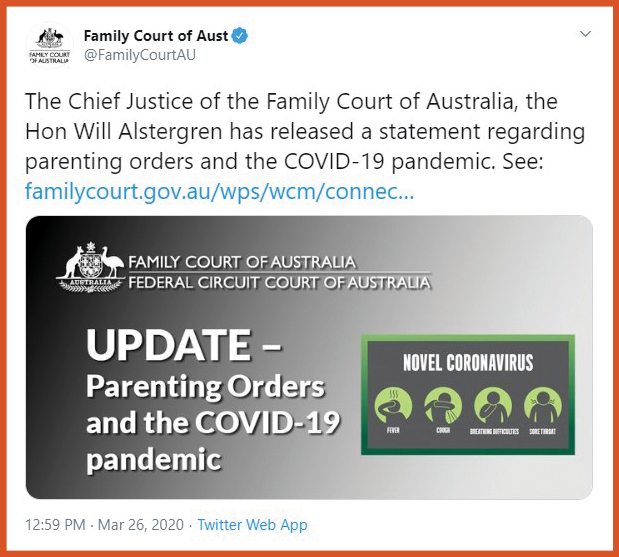Corporate governance
The Chief Justice, assisted by the Chief Executive Officer (CEO) and Principal Registrar, is responsible for managing the administrative affairs of the Court.
Under the Constitution, judicial power is vested in judges who administer that power in Court. The Family Law Act 1975 (Cth) states that the Court shall consist of a Chief Justice, a Deputy Chief Justice and senior judges and other judges. By delegation from the Chief Justice, case management judges assist in administering judicial functions in particular areas, such as case management. The judges’ committee structure facilitates collegiate involvement of the judges of the Court.
The Family Court is autonomously governed; that is, the Chief Justice has the responsibility for the administration of the Court. To enable the effective and efficient administration of justice, the judiciary needs support to deal with its workload. Non-judicial Court employees, who are public servants, provide that support. In addition, there are arrangements in place with other Courts for the supply of services.
The CEO and Principal Registrar is subject to directions from the Chief Justice. The agency head under the Public Service Act 1999 is the CEO and Principal Registrar of the Federal Court.
Senior executives
Chief Executive Officer and Principal Registrar

David Pringle
The CEO and Principal Registrar is appointed to assist the Chief Justice to administer the Court. The CEO and Principal Registrar’s powers are broad (s 38D Family Law Act 1975), although subject to directions from the Chief Justice (s 38D(3)). David Pringle was appointed the CEO and Principal Registrar on 17 April 2020.
Deputy Principal Registrar and National Family Law Registrar

Virginia Wilson
Deputy Principal Registrar and National Family Law Registrar undertakes the national management of registrars, including building a consistent practice, oversight of the nature of their casework and workload and leadership in respect of professional development; liaises with internal and external stakeholders in areas of registrar practice; and engages with judges to identify critical work to be undertaken by registrars in support of judges for the effective case management and disposition of proceedings.
Executive Director, Child Dispute Services

Janet Carmichael
The Executive Director, Child Dispute Services has national responsibility for the professional requirements of child dispute services in the Family Court and the Federal Circuit Court. The Executive Director provides strategic advice to the Chief Justice, the Chief Judge, and CEO and Principal Registrar in relation to the effective and efficient operation of child dispute services, with particular attention to the achievement of best practice standards in policy, practices and service delivery. The Executive Director works closely with external child and family dispute resolution bodies, as well as relevant tertiary institutions, which are important to the development and ongoing maintenance of high-quality child dispute services, quality assurance and accreditation processes.
Committees
Policy Advisory Committee
At the strategic level, this committee is the peak policymaking body within the Court. The committee’s role is to support the Chief Justice in the administration of the Court and to provide strategic advice and policy direction, particularly in relation to legislative, procedural and administrative changes likely to affect the Court and its users.
As at 30 June 2020 members of the Policy Advisory Committee were:
- The Honourable Chief Justice William Alstergren (Chair)
- The Honourable Deputy Chief Justice Robert McClelland
- The Honourable Justice Stewart Austin
- The Honourable Justice Janine Stevenson
- The Honourable Justice Robert Benjamin AM
- The Honourable Justice Kirsty Macmillan
- The Honourable Justice Shane Gill
- The Honourable Justice Michael Baumann AM
- The Honourable Justice Jillian Williams, and
- CEO and Principal Registrar David Pringle.
Finance Committee
The Finance Committee’s principal focus is to:
- consider and define the full cost and budgetary requirements of the Family Court
- consider spending and budgetary priorities that affect core judicial work
- discuss budgetary priorities and the allocation of financial resources
- consider the budgetary requirements of the Court following the changes to the administration of the Family Court pursuant to the Public Governance, Performance and Accountability Act 2013, and
- ensure transparency in respect of expenditure and the setting of budgetary priorities that affect core judicial work.
The Finance Committee is chaired by Justice Benjamin and includes Justice Watts and Justice Austin.
Rules Committee
The Rules Committee is established in contemplation of s 123 of the Family Law Act 1975 (Cth), which provides that a majority of judges may make rules of Court in relation to practices and procedures to be followed in the Court. The Rules Committee considers proposed changes to the Family Law Rules 2004 (Cth) with a view to improving the efficiency, accessibility and cost effectiveness of the Family Court for its clients. The committee also undertakes detailed consideration of discrete issues as required.
Court Performance Committee
The Court Performance Committee is chaired by Deputy Chief Justice McClelland and its membership comprises all registry case management and Magellan judges.
Case management
The principles devised in 2015 to guide the operation of the Court’s ‘trial docket’ system of case management have been implemented in all registries, enhancing consistency across the Court in the way it manages its case-flow. The system envisages that only those cases that cannot be consensually resolved by intervention of registrars are allocated to judicial dockets for procedural management by judges to final trial.
Magellan
The Magellan protocol is a discrete case management pathway designed to ensure that cases involving allegations of sexual abuse or serious physical abuse of children are heard within six months of such allegations being raised in the litigation before the Court. Due to the increasing vigilance of the registry Magellan teams, cases are not categorised so easily as ‘Magellan’, which means the truly deserving cases are getting closer and faster attention. As at 30 June 2020, there were 144 active Magellan cases.
Judicial Education and Professional Development Committee
The aim of the Judicial Education and Professional Development Committee is to develop, implement and oversee judicial education in the Court by formulating a comprehensive plan for ongoing and extensive judicial education and to provide advice to the Chief Justice on judicial education issues.
The committee, chaired by Justice Macmillan, assists the Chief Justice in the dissemination of information his Honour considers should be brought to the attention of the judges. The committee also develops education programs and puts in place mechanisms to support judges to maintain resilience and to provide orientation for new appointments.
Activities were conducted as part of the annual judge’s conference on 9 September 2020.
Judicial Welfare Committee
The aim of the Judicial Welfare Committee is to develop and implement judicial wellbeing initiatives in the Court and to provide advice to the Chief Justice on judicial wellbeing issues. The committee is chaired by Justice Gill and includes Justices Macmillan, Forrest and Stevenson.
Work of the sub-committees
Children’s Committee
The Children’s Committee, a joint initiative between the Family Court and the Federal Circuit Court, meets to explore the work to be undertaken with respect to the involvement of children in parenting proceedings and improving the experiences of children in the family law system.
Membership for 2019–20 included:
- Judge Cole OAM (Federal Circuit Court) Chair
- Justice Moncrieff (Family Court of Western Australia)
- Justice Forrest (Family Court)
- Janet Carmichael (Family Court/ Federal Circuit Court)
- Kylie Beckhouse (Legal Aid, New South Wales)
- Alexandra Wearne (Independent Children’s Lawyer, New South Wales)
- Kate Bint (Independent Children’s Lawyer, Queensland), and
- Gayathri Paramasivam (Victoria Legal Aid).
Aboriginal and Torres Strait Islander Outreach Committee
The Aboriginal and Torres Strait Islander Outreach Committee continues the long history of the Court in promoting and improving access to justice for Indigenous families, by ensuring the Court’s administration and judiciary work together to enable and facilitate the participation of Indigenous Australians in the Court’s operations and processes.
The committee continues to undertake work to:
- develop a Court protocol for Acknowledgement of Country at Court events
- examine the potential for a resource of information relevant to Aboriginal and Torres Strait Islander outreach issues to be available for general access
- establish and build a link between the Court’s registries and local Indigenous leaders, and
- collaborate with the Family Court of Western Australia, the Federal Circuit Court, state courts and tribunals, the National Judicial College and relevant state judicial education authorities such as the Judicial Commission of New South Wales.
Family Violence Committee
The Family Violence Committee is a joint committee of the Family Court and the Federal Circuit Court. The committee’s principal responsibility is to provide advice to the Chief Justice, the Chief Judge and the CEO and Principal Registrar of both Courts on the issue of family violence.
In discharging this responsibility, the committee reviews and updates the Courts’ Family Violence Plan and Family Violence Best Practice Principles, as well as undertaking discrete projects.
Membership of the committee at 30 June 2020 was:
- Judge Hughes (Chair)
- Justice Benjamin AM
- Justice Gill
- Justice Baumann AM
- Judge Spelleken
- Judge Terry
- Judge Bender
- David Pringle (CEO and Principal Registrar)
- Janet Carmichael
- Virginia Wilson
- Steve Fewster
- Di Lojszczyk
- Lisa O’Neill, and
- Melissa Buhagiar (Secretariat).
The committee’s focus during the year was on a number of initiatives including implementing safety at Court policies and establishing the co-location of state and territory child welfare officials in the Courts’ family law registries. In early 2020, state and territory child welfare officials and police were co-located in the busiest family law registries of the Family Court and Federal Circuit Court as part of a co-location initiative announced by the Federal Government. The co-location initiative is intended to improve the sharing of information between the state and territory police and child welfare authorities and the family courts, and ensure that this information is available to judges and registrars at the earliest opportunity. Child welfare officials are co-located in most registries save for the Northern Territory. Police officials are co-located in most registries save for the Northern Territory and Victoria.
Collaborative committees
Joint Costs Advisory Committee
The committee comprises representatives of the four federal courts: the High Court of Australia, the Federal Court, the Family Court and the Federal Circuit Court.
Membership as at 30 June 2020 was:
- Justice Benjamin AM, Family Court (Chair)
- Philippa Lynch, CEO and Principal Registrar, High Court of Australia
- Scott Tredwell, Acting Deputy Principal Registrar, Federal Court
- Virginia Wilson, Deputy Principal Registrar, Family Court/ Federal Circuit Court, and
- Amanda Morris, Family Court/ Federal Circuit Court.
Scales of costs
The current cost scales for each of the federal courts are provided for in the following legislation:
- High Court Rules 2004 Schedule 2
- Federal Court Rules 2011 Schedule 3
- Family Law Rules 2004 Schedule 3, and
- Federal Circuit Court Rules 2001 Schedule 1.
Joint Rules Harmonisation Working Group
The Rules Harmonisation Working Group is a joint committee of the Family Court and the Federal Circuit Court, comprising judges of both Courts, responsible for developing a common set of rules, forms and case management in the Courts.
The working group is chaired by the Honourable Dr Chris Jessup QC. Dr Jessup is also assisted by two barristers, Ms Emma Poole and Mr Christopher Lum. Members of the group are working closely with the judges to draft the common rules and forms and aid the development of a consistent approach to case management.
Members of the working group for 2019–20 included:
- Dr Chris Jessup QC (Chair)
- Chief Justice Alstergren
- Deputy Chief Justice McClelland (Family Court)
- Justice Ryan (Family Court)
- Justice Watts (Family Court)
- Justice Rees (Family Court)
- Justice Williams (Family Court)
- Justice Hartnett (Family Court)
- Judge Driver (Federal Circuit Court)
- Judge Hughes (Federal Circuit Court)
- Judge Harland (Federal Circuit Court)
- David Pringle
- Virginia Wilson
- Emma Poole
- Christopher Lum, and
- Jordan Di Carlo.
Research and Ethics Committee
The Research and Ethics Committee is a joint committee established to consider and advise on research proposals that are received by the Courts on their merits and against ethical guidelines.
Membership of the committee comprises:
- Justice Stevenson (Chair)
- Justice Gill
- Judge M. Neville
- Virginia Wilson
- Manuela Galvao, and
- Michael Raine (Secretariat).
External and internal scrutiny
Commonwealth Ombudsman
The Commonwealth Ombudsman made no adverse report specific to the Family Court during 2019–20.
Freedom of information
The Court received nine freedom of information requests during 2019–20.
Action in defamation
There were no actions in defamation during 2019–20.
Senate estimates hearings – Legal and Constitutional Affairs Committee
Senior Executive Service staff of the Court attend estimates committee hearings to answer questions about the Court’s activities. In 2019–20, seven questions on notice were received and answered by the Family Court.
Media and stakeholder management
The Court’s National Manager, Media and Public Affairs is responsible for the management of all media requests and inquiries received by the Court. These inquiries may relate to specific cases, judgments for cases or more broadly on issues relating to family law. The Court is frequently asked to provide public comment on topics relating to the work of the Court and its jurisdiction.
During 2019–20, the Court disseminated 14 media releases and provided many statements to individual journalists upon request.
Engaging with the media is an important part of communicating the work of the Court to the Australian public. The Chief Justice is committed to open justice and in line with that commitment, his Honour participated in a significant number of interviews with journalists during the reporting year and provided many statements to the media.
This engagement became particularly important during the COVID-19 pandemic in the first half of 2020. Circumstances arising from the crisis led to separated and divorced parents questioning how to adhere to parenting orders or manage shared-parenting arrangements in situations where travel across state borders was restricted, schools and contact centres were closed, and parents were concerned for the safety and welfare of their children.
To provide some guidance for parents and the community at large, the Chief Justice undertook the unorthodox step of making a public statement outlining the Court’s expectations in regard to court orders and offering general advice as to the options available to parents in seeking support and assistance. Of great importance to the Court during this time was communicating to the public that the Court was available to deal with cases, and if an urgent hearing was required due to circumstances arising from the pandemic, parents could apply to have their dispute dealt with as part of the Court’s COVID-19 urgent list.
To promote this information, the Chief Justice participated in interviews with the following media outlets:
- ABC TV – The Drum
- ABC Radio National
- ABC radio – The Law Report
- Triple M radio – Melbourne
- 3AW radio – Melbourne
- 97.3 FM radio – Brisbane
- The Age newspaper
- The Australian newspaper.
During the reporting year, the Chief Justice also participated in several webinars hosted by the Law Institute of Victoria, the Family Law Section of the Law Council of Australia and other organisations. For more information, see Appendix 7 (Judge activities).
In addition to the media activities relating to the pandemic, the Chief Justice provided interviews or articles for several law journals including:
- Proctor – Queensland Law Society
- Victorian Bar News
- Law Institute Journal – Law Institute of Victoria
- Law Society Journal – New South Wales Law Society
- The Bulletin – Law Society of South Australia
- Australian Family Lawyer.
Direct communication with stakeholders is of significant importance to the Court. In 2019–20, the Court established a series of meetings to hear from various groups that have involvement in or interest in family law and the Court. Some of those groups included Women’s Legal Services, Relationships Australia, Legal Aid, Law Societies and Bar Associations, Men’s Referral Services, Men’s Rights Agency, Lone Fathers Association, Women’s Safety NSW and No to Violence.
Social media
The Court uses social media to communicate in real time with Court users and the profession.
Twitter provides followers with timely, relevant and easy access to information about the Court and family law issues. Followers are predominately legal professionals, law students, journalists and members of the general public.
Tweets include:
- Judgments, reports, publications and factsheets
- Legislative news – changes to rules, practice directions, forms or fee updates
- Commonwealth Courts Portal news, and
- Media releases and statements.
During the pandemic, Twitter was an effective tool for quickly distributing information to the profession and Court users.
2019–20 Twitter statistics at a glance
5,014 followers
118 tweets sent
Average of two per week
Top tweet 26 March 2020

The Court’s Twitter address is
www.twitter.com/FamilyCourtAU
YouTube
The Court’s YouTube channel provides a range of videos to help litigants prepare for and understand Court processes.
During 2019–20, the Court’s channel had 762 subscribers and a total of 24,727 views, with 1,183 hours watched.
The most viewed videos were ‘How to apply for a divorce: serving divorce papers’, which provides a step-by-step guide to serving divorce papers in Australia and ‘Mediation – what to expect’, which features a re-enactment of the mediation process between a separated couple deciding on parenting arrangements.
During the COVID-19 pandemic, Chief Justice Alstergren participated in a number of media interviews to help inform the community about Court operations and managing parenting arrangements. One of these radio interviews with Triple M Melbourne was also published on YouTube.
The Court’s YouTube channel is at
www.youtube.com/user/familycourtAU.
Correction of errors in the 2018–19 annual report
Figure 3.16 on page 26 contains the wrong data in the bar for 2018–19. It should read as follows:
- 80% (both represented),
- 15% (one party represented), and
- 5% (neither have representation).